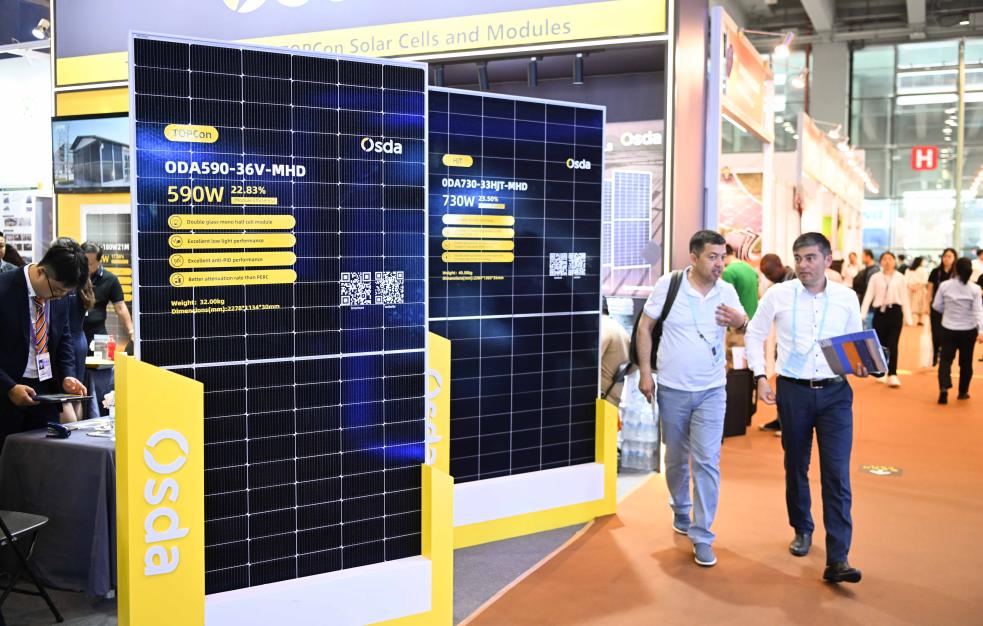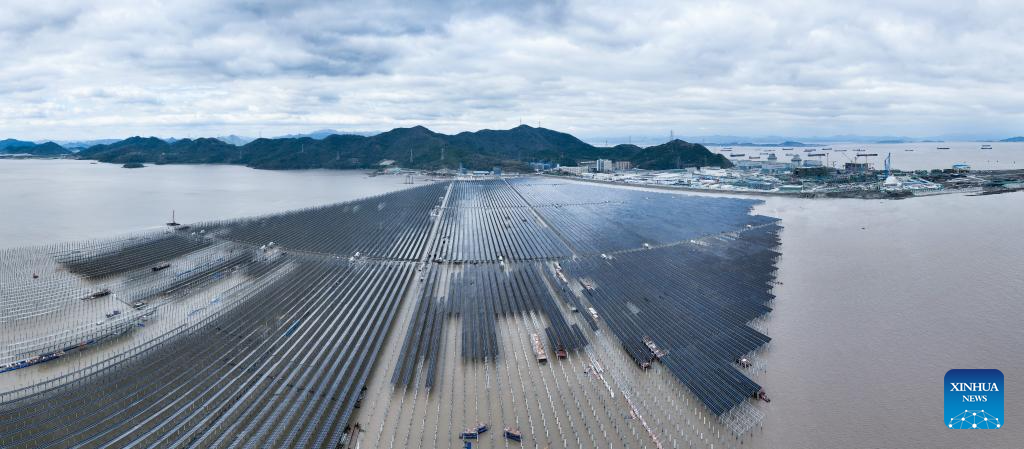Complaints are baseless against China green product exports
In the US, some are pushing a narrative about Chinese overcapacity in the new energy sector.
They argue that China's excess production of new energy vehicles, lithium-ion batteries and photovoltaic products – referred to as the "new three" by Chinese state media – is distorting the market and harming their economies.
But let's fact-check. Let's head to the Canton Fair (China Import and Export Fair), a key event for China and international trade.
The fair's first phase, themed around advanced manufacturing, ran from April 15 to 19. The exhibits for new energy vehicles and smart transportation were bustling.

Overseas purchasers walk past a booth exhibiting solar battery products during the 135th session of the China Import and Export Fair in Guangzhou, south China's Guangdong Province, April 15, 2024. (Photo: Xinhua)
American importer Steven Selikoff noted global interest in China's green technology and his eagerness to explore business opportunities there.
As of April 19, 125,440 oversea buyers from 212 countries and regions around the world attended the fair, marking a notable increase of 23 percent compared to the previous fair.
Among them, 22,694 buyers came from Europe and the US, accounting for 18 percent.
On the one hand, some people said that China's overcapacity in green technology harms the economies of other countries. On the other, people across the world are interested in China's green technology. The contrast speaks to a greater truth.
Overcapacity means supply exceeds demand in the market.
As the impact of climate change intensifies, countries are exploring paths of greener low-carbon development.
More than 130 countries have declared the goal of achieving net-zero emissions by the middle of the 21st century.
Green trade will become a new engine for global trade growth in the future.
According to the International Energy Agency, global demand for new energy vehicles in 2030 will quadruple that of 2022 and demand for new photovoltaic installations will reach 820 gigawatts, about four times that of 2022.
In other words, there is a severe shortage, not surplus, of capacity in green technology.

An aerial drone photo taken on March 26, 2024 shows a photovoltaic power project in Sanmen County of Taizhou City, east China's Zhejiang Province. (Photo: Xinhua)
Let's take a look at this using the basic laws of economics. According to the theory of comparative advantage, if a country is able to produce a certain product at a lower cost, other countries should import that product rather than set tariff barriers, while exporting the product in which they have a comparative advantage.
In China, developing green industries and expanding green trade is a choice in line with the global development trend.
Photovoltaics, lithium-ion batteries and new energy vehicles have developed a certain competitive advantage on the global market, which helps countries around the world to implement the United Nations 2030 Agenda for Sustainable Development and the goals of the Paris Agreement.
China's green contribution to the world economy is tangible.
Amid global economic challenges, China's complete industrial chains offer high-quality, efficient and reasonably priced green products like photovoltaics, lithium-ion batteries and new energy vehicles, easing global inflationary pressure and supporting supply chain stability.
Let's examine the data: In 2023, the global newly installed capacity of renewable energy rose to 510 million kilowatts, to which China contributes more than half.
China's high-quality clean energy products have been exported to more than 200 countries and regions.
China has developed cooperation on green energy projects with more than 100 countries and regions, effectively solving their electricity supply and price problems.
International Renewable Energy Agency data shows significant cost reductions in wind and photovoltaic power over the past decade, attributable to Chinese innovation and manufacturing prowess: The average kilowatt-hour cost of global wind power decreased by over 60 percent and photovoltaic power generation 80 percent.
Experts like Oliver Haunch from Grant Thornton UK see Chinese products as market opportunities rather than threats. They argue that Western consumers benefit from lower prices and Chinese innovation pushes European manufacturers to improve.

Electric buses produced by the Chinese manufacturer Yutong Bus Co., Ltd. are pictured in Valletta, Malta, on April 12, 2024. One of Malta's leading tourist transport operators has added four electric buses produced by the Chinese manufacturer Yutong Bus Co., Ltd. to its fleet, in line with its commitment to go green and curb emissions. (Photo: Xinhua)
The whole world is sharing the market dividends brought by China's green development.
Peter Fischer penned an article in Swiss German-language daily newspaper Neue Zürcher Zeitung headlined "China's 'overcapacity': Western complaint hypocritical and short-sighted."
He suggests that the West can purchase solar panels and wind turbines at lower prices and if innovative Chinese electric cars force European manufacturers to improve, consumers should be pleased.
Many facts dispel the fallacy of China's alleged new energy overcapacity.
What needs caution is that, confronted with the comparative advantages of China's new energy industry's independent innovation achievements, some individuals in the US are not thinking about mutual benefits or complementary strengths and weaknesses.
Instead they are trying to find ways to criticize and label, fueling anti-globalization and trade protectionism, which is worrying.
From China threat theory through China shock theory to today's overcapacity theory, certain individuals in certain countries keep spinning variations of the China threat narrative, politicizing economic and trade issues, imposing trade restrictions and distorting market order. This not only hampers productivity but also harms both domestic and global consumers.
International experts have pointed out that the narrative of overcapacity provides an excuse for protectionism, which is potentially dangerous for global trade.
Its purpose is to restrain the technological development and industrial upgrading of developing countries represented by China, and to maintain the economic hegemony of certain countries globally through unfair means. This is bound to be unpopular.
Openness brings progress, while isolation inevitably leads to backwardness. This year's Chinese government work report once again stressed, "We must deepen reform and opening-up with greater determination and intensity."
A sustainably developing and more open China will bring more development opportunities to the world.
Only when all countries in the world work hand in hand can we sing a harmonious melody of common development for all humanity.
(Translated by Zhang Jingjie and Liu Lifeng; Edited by Zhan Huilan and Li Zhuoman)
Photos
Related Stories
- China's exports no threat to industries in Global South: Asia Times
- Experts, execs attribute edge in exports to tech strength
- China's virtual power plants pave way for green energy transition
- Huawei teams up with Ethiopian telecom companies for green energy solutions
- Chinese-made tunnel-boring machine to be exported to Italy
- How has efficiency improved in Yiwu?
Copyright © 2024 People's Daily Online. All Rights Reserved.









